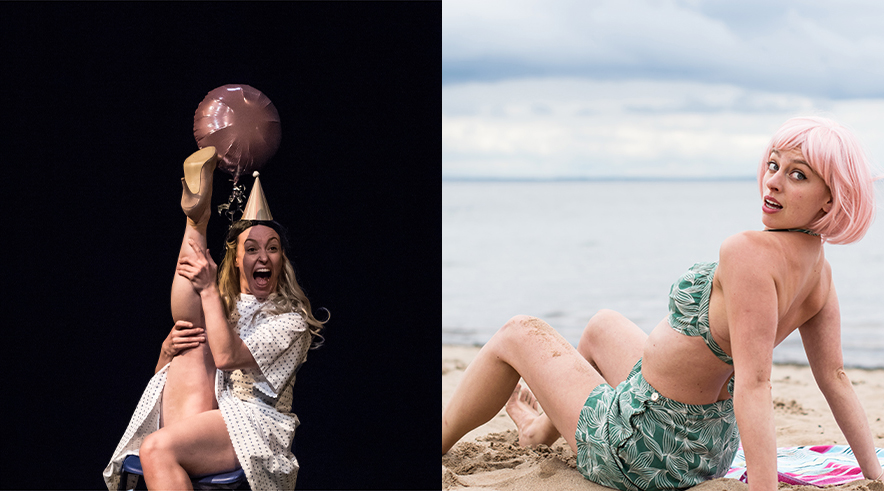Severe trauma is the theme of both solos in this double bill of Scottish choreographer/dancers at Dance Base in Edinburgh’s Grassmarket. Both employ humour despite their serious subjects: cancer (Hodgkin’s Lymphoma) in Emma Jayne Park’s It’s Not Over Yet… (★★★★★), and something less clear, probably relationship break-up, in Tess Letham’s How to Survive the Future (★★★✩✩).
Letham performs her inaugural show with dedication and intensity. With a strong stage presence, she presents vignettes, often ironically, as she moves through the various stages of suffering and survival. She uses a lot of mime as if she fears her movement will not tell the story adequately. Making broad use of the stage and varying her speed, she employs a wide range of movement and yet there is a similarity of choreographic tone throughout.
Set on a beach with a good range of costume changes, two wigs and two hairstyles, her work is attractive to view and most dramatic in intensity. Though fully committed – she throws herself onto the floor with the painful sound of knees on wood, she contorts and writhes with movement that should convey sorrow and hurt – it does not involve on a visceral level. It has not yet developed into a mature piece.
It’s Not Over Yet from Park’s (working under the creative handle Cultured Mongrel and with a fellowship to her name), is another thing entirely – this is a very strong, deep and well-balanced work. The raw emotion is inherent throughout in the long arms reaching and encircling the neck, the chin lifting while the throat stretches, the twisting and the sinking of the solar plexus. Almost entirely performed sitting on a chair, Park utilises a motif of hand wringing, wrist twisting movements which are complex enough to be repeated over and over, encapsulating the awful repetition of chemo treatments, sustaining our interest. This is compelling and we pay close attention to detail, as does she in her mindful performance.
Grimaces and grins are fleeting yet connect immediately with the audience. There is no self-pity here, neither yawn-making exposition of what it is like to have the big c. Yes, all the terrible symptoms (hair loss, sickness) are there, the endless “how are you?”s and “are you better now?”s of well-meaning friends and hospital staff are there, but they are conveyed with originality and intense mindfulness of performance.
Beware the sweeties! What you dread to see as you watch that brilliant section unfold, does.
